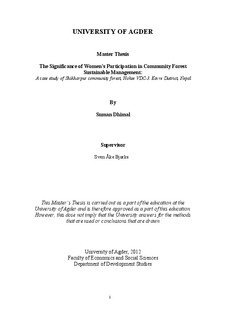The Significance of women's participation in community forest sustainable management : a case study of Shikharpur community forest, Hokse VDC-3. Kavre district, Nepal
Master thesis
Permanent lenke
http://hdl.handle.net/11250/135261Utgivelsesdato
2012Metadata
Vis full innførselSamlinger
Sammendrag
Community forest programmes are prioritized in the Nepal government forestry
sector. This program was started in Nepal during the late 1970s. The main objective
of this program is to ensure local people’s participation for better forest management.
Prior to the 1970s deforestation was very high due to the government nationalization
act of local forests. The government had restricted local peoples access to forests. As
a result, people were aggressively opposed to the government’s actions, and
deforestation became a serious problem in rural Nepal. The government realized this
as a fact and started a participatory approach in different government programs to
mitigate the situation.
Nepal is a nation with Hindu majority where, most social, cultural and economical
practices have male domination. Women are responsible for household chores like;
making food, taking care of the babies, collecting firewood, fodder, green grass and
tending to livestock. Women are closely related with forest activities. They have wide
knowledge about forests, forests product and management of forests. Their active
participation from problem identification to decision making and benefit sharing
stages play a vital role for sustainable resource management. In practice, women
participation is very low in community forestry program. There are several factors
affecting women’s participation such as; socio-cultural norms and values, poor
education, poor economic conditions, gender bias, cast domination etc. These factors
determine the rate of women’s participation in Shikharpur community forest of Hokse
VDC. These factors not only affect in community forest programs, but also affect
women’s active participation in different government programs in Nepal. Women’s
participation can improve through different community awareness programs and
through the active role of government and private sectors. Awareness programs may
increase local people’s understanding of the significance of women’s participation in
sustainable forest management. People at Shikharpur depend on forests because
firewood is their main source of energy in their everyday life. Livestock and
agricultural activities are also correlated with forests. Therefore sustainable
management of Forests is essential. The government should consider enforcing a rule
for a minimum percentage of women participation at different stages of project
management. Social organizations, NGOs, INGOs, and the government should focus
on improving education and economic conditions in the researched zone, and develop
the attitude of women’s active participation is vital for good forest management
Beskrivelse
Master thesis in development management- University of Agder 2012
